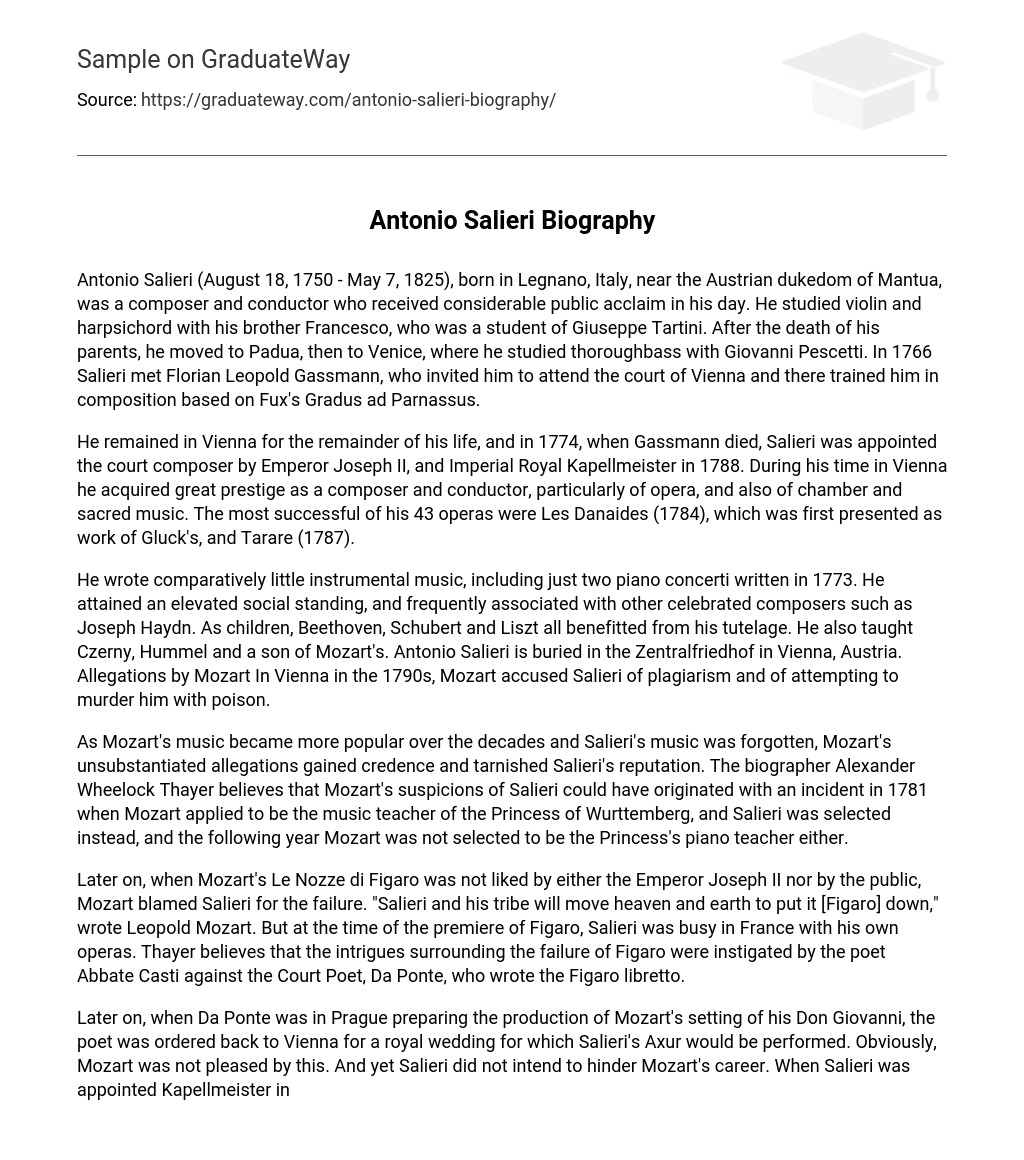Antonio Salieri, born on August 18, 1750, in Legnano, Italy, near the Austrian dukedom of Mantua, was a renowned composer and conductor of his time. He gained significant public recognition for his talent. Salieri’s musical education involved studying violin and harpsichord under his brother Francesco, who learned from Giuseppe Tartini. Following the death of his parents, Salieri relocated to Padua and then Venice, where he learned thoroughbass from Giovanni Pescetti. In 1766, Salieri crossed paths with Florian Leopold Gassmann, who offered him the opportunity to join the court of Vienna and received training in composition based on Fux’s Gradus ad Parnassus.
Remaining in Vienna until his death, Salieri became the court composer and Imperial Royal Kapellmeister after Gassmann’s passing in 1774, a position appointed by Emperor Joseph II. He garnered tremendous recognition as a composer and conductor, excelling in the genres of opera, chamber music, and sacred music. Among his 43 operas, Les Danaides (1784) and Tarare (1787) were particularly triumphant, with the former initially credited to Gluck.
Antonio Salieri, a renowned composer, had a limited output of instrumental music. He composed only two piano concerti in 1773. Despite this, he achieved a high social status and frequently associated with other famous composers like Joseph Haydn. Notably, Beethoven, Schubert, and Liszt all received instruction from him during their childhood. He also taught Czerny, Hummel, and one of Mozart’s sons. Antonio Salieri’s final resting place is the Zentralfriedhof in Vienna, Austria. In the 1790s, Mozart accused Salieri of plagiarism and attempted murder through poison.
Over time, Mozart’s music gained popularity while Salieri’s music was forgotten, leading to the acceptance of Mozart’s unproven accusations that damaged Salieri’s reputation. According to biographer Alexander Wheelock Thayer, Mozart’s suspicions of Salieri may have stemmed from an event in 1781. During this time, Mozart had applied to be the music teacher of the Princess of Wurttemberg, but Salieri was chosen instead. The following year, Mozart was again overlooked for the position of the Princess’s piano teacher.
Later on, when Mozart’s Le Nozze di Figaro received negative feedback from both Emperor Joseph II and the public, Mozart accused Salieri of being responsible for its failure. Leopold Mozart wrote, “Salieri and his colleagues will do everything in their power to undermine it [Figaro].” However, during the premiere of Figaro, Salieri was occupied in France working on his own operas. Thayer suggests that the conspiracies surrounding the failure of Figaro were orchestrated by poet Abbate Casti against Court Poet Da Ponte, who wrote the libretto for Figaro.
Da Ponte went to Prague to prepare Mozart’s adaptation of his Don Giovanni opera, but he had to return to Vienna for a royal wedding where Salieri’s Axur would be performed. This made Mozart visibly unhappy, although Salieri did not want to obstruct Mozart’s career. In 1788, when Salieri became Kapellmeister, instead of composing his own opera, he chose to revive Figaro. As Salieri’s health declined and he was hospitalized in his last years, rumors spread that he had confessed to murdering Mozart.
Both of Salieri’s nurses confirmed that he did not make the statement in question and that one of them was present with him during his time at the hospital. Nicolai Rimsky-Korsakov’s opera “Mozart et Salieri” (1898) started a tradition of sensationalism after Salieri’s death, which was inspired by Mozart’s accusations and verged on defamation. This tradition continued in Peter Shaffer’s play “Amadeus” (1979), which later became an Oscar-winning film in 1984. The film released a “Director’s Cut” version in 2001, including an additional 20 minutes of footage.
The movie portrays Salieri as both a murderer and an inadequate composer who blasphemes by setting fire to a crucifix, tarnishing his reputation. However, despite this depiction, it is evident in all of his compositions that Salieri has talent, and his biographers consistently affirm his unwavering religious devotion.





